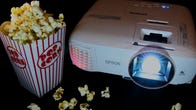The best way to watch a movie or TV show, or play a video game, is on a huge screen — and a projector can get bigger than any TV. The prices of 4K projectors have fallen significantly the last few years, though ultra HD 4K projectors still cost more than their 1080p counterparts.
That said, the low end of the 4K projector range is now only slightly more than the high end of the 1080p range, so 4K content is at your fingertips. Remember, though, resolution is just one aspect of picture quality. A projector with a great contrast ratio, color gamut, keystone correction and brightness can easily hold its own over a 4K UHD projector that only offers higher resolution at the expense of everything else. The best 4K projectors combine great performance in all aspects of picture quality along with 4K resolution for truly incredible images.
If you’re ready to take your home theater to the next level, here are the best projectors you can get for 4K content. Check out our list of the best home theater projectors for 2022 for more, often less expensive, options if 4K HDR isn’t your top priority. Or, if portability is your main concern, we also have a list that will help you find a portable projector to take on the go.

 \n ","topic":"Computer Accessories","ttag":"cxity","variant":"","viewguid":"","event":"listicle|image|1","correlationId":"","assettitle":"","campaign":"cxity","cval":48,"leadCpc":0.48,"leadProdPrice":2999.99,"manufacturer":"Epson","productName":"Epson Home Cinema 5050UB","seriesGuid":"62a8699e-5e55-4412-b268-f567df809545","sku":"Home Cinema 5050UB","reviewId":"f6dad728-9be2-4da6-838a-46be5c8a6553","formatType":"IMAGE","location":"LIST","position":1,"dwLinkTag":"article-body|listicle|image","selector":"#article-body #listicle-de978508-4702-43b1-989b-3435a0a08d24 .itemImage"}}” rel=”noopener nofollow” target=”_blank”>
\n ","topic":"Computer Accessories","ttag":"cxity","variant":"","viewguid":"","event":"listicle|image|1","correlationId":"","assettitle":"","campaign":"cxity","cval":48,"leadCpc":0.48,"leadProdPrice":2999.99,"manufacturer":"Epson","productName":"Epson Home Cinema 5050UB","seriesGuid":"62a8699e-5e55-4412-b268-f567df809545","sku":"Home Cinema 5050UB","reviewId":"f6dad728-9be2-4da6-838a-46be5c8a6553","formatType":"IMAGE","location":"LIST","position":1,"dwLinkTag":"article-body|listicle|image","selector":"#article-body #listicle-de978508-4702-43b1-989b-3435a0a08d24 .itemImage"}}” rel=”noopener nofollow” target=”_blank”>
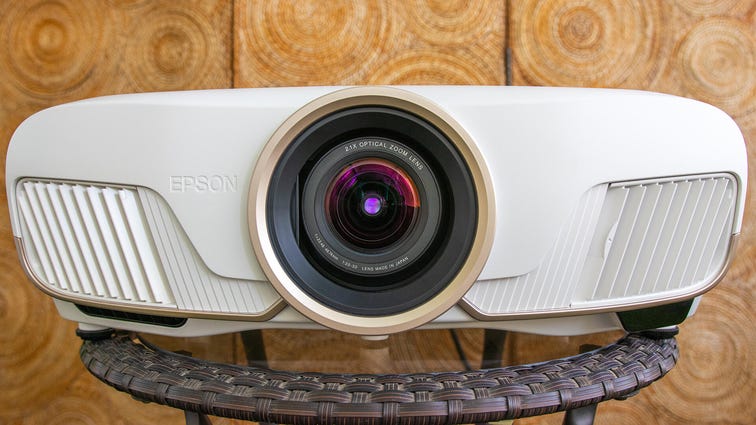

Geoffrey Morrison/CNET
The Epson Home Cinema 5050UB is the best all-around 4K projector because it has the perfect balance between image quality and price. An excellent contrast ratio, paired with impressive brightness and accurate color, all with better detail than what’s possible with a 1080p projector, and you’ve got all the pieces for a fantastic image. This UHD projector is not cheap, but offers a significant step up in image quality over other 4K projectors. Extensive lens shift and a motorized zoom are the icing on the cake.

 \n ","topic":"Projectors","ttag":"cxity","variant":"","viewguid":"","event":"listicle|image|2","correlationId":"","assettitle":"","campaign":"cxity","cval":48,"leadCpc":0.48,"leadProdPrice":3999.99,"manufacturer":"Epson","productName":"Epson Home Cinema LS11000","seriesGuid":"eebdea6f-b303-4674-83bf-a7b44eef7539","sku":"V11HA48020","reviewId":"","formatType":"IMAGE","location":"LIST","position":2,"dwLinkTag":"article-body|listicle|image","selector":"#article-body #listicle-41e9e009-8f19-4e4c-a05b-eae1165f553b .itemImage"}}” rel=”noopener nofollow” target=”_blank”>
\n ","topic":"Projectors","ttag":"cxity","variant":"","viewguid":"","event":"listicle|image|2","correlationId":"","assettitle":"","campaign":"cxity","cval":48,"leadCpc":0.48,"leadProdPrice":3999.99,"manufacturer":"Epson","productName":"Epson Home Cinema LS11000","seriesGuid":"eebdea6f-b303-4674-83bf-a7b44eef7539","sku":"V11HA48020","reviewId":"","formatType":"IMAGE","location":"LIST","position":2,"dwLinkTag":"article-body|listicle|image","selector":"#article-body #listicle-41e9e009-8f19-4e4c-a05b-eae1165f553b .itemImage"}}” rel=”noopener nofollow” target=”_blank”>
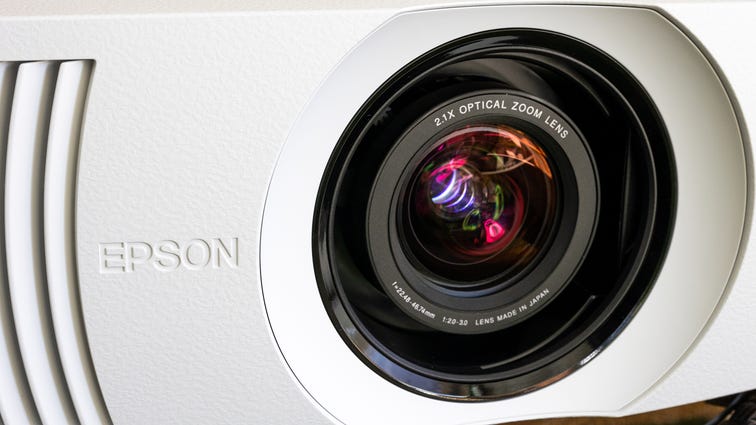

Geoff Morrison/CNET
The Epson LS11000 uses an entirely different technology to create light: lasers! Most other projectors use UHP lamps instead, which are glorified light bulbs. This allows the LS11000 to create a bright, colorful image with faster startup and shutdown times, no lamp replacement, and a better dynamic contrast ratio. While it is more expensive, at first, than the HC5050, over the life of the projector they’ll cost about the same. The 5050 performs better in a few areas, but overall the LS11000 creates a deeply colorful, highly detailed image.

 \n ","topic":"Projectors","ttag":"amazon","variant":"","viewguid":"","event":"listicle|image|3","correlationId":"","assettitle":"","campaign":"amazon","cval":36,"leadCpc":0.36,"leadProdPrice":4998,"manufacturer":"Sony","productName":"Sony VPL-VW325ES (Black)","seriesGuid":"59c801f3-95da-48f4-88bd-572346a2d911","sku":"VPL-VW325ES","reviewId":"997ea9bb-9d6b-42e7-8fa0-bb6875124b86","formatType":"IMAGE","location":"LIST","position":3,"dwLinkTag":"article-body|listicle|image","selector":"#article-body #listicle-9408e4b2-0695-4f64-8bb8-deaa254b23f4 .itemImage"}}” rel=”noopener nofollow” target=”_blank”>
\n ","topic":"Projectors","ttag":"amazon","variant":"","viewguid":"","event":"listicle|image|3","correlationId":"","assettitle":"","campaign":"amazon","cval":36,"leadCpc":0.36,"leadProdPrice":4998,"manufacturer":"Sony","productName":"Sony VPL-VW325ES (Black)","seriesGuid":"59c801f3-95da-48f4-88bd-572346a2d911","sku":"VPL-VW325ES","reviewId":"997ea9bb-9d6b-42e7-8fa0-bb6875124b86","formatType":"IMAGE","location":"LIST","position":3,"dwLinkTag":"article-body|listicle|image","selector":"#article-body #listicle-9408e4b2-0695-4f64-8bb8-deaa254b23f4 .itemImage"}}” rel=”noopener nofollow” target=”_blank”>
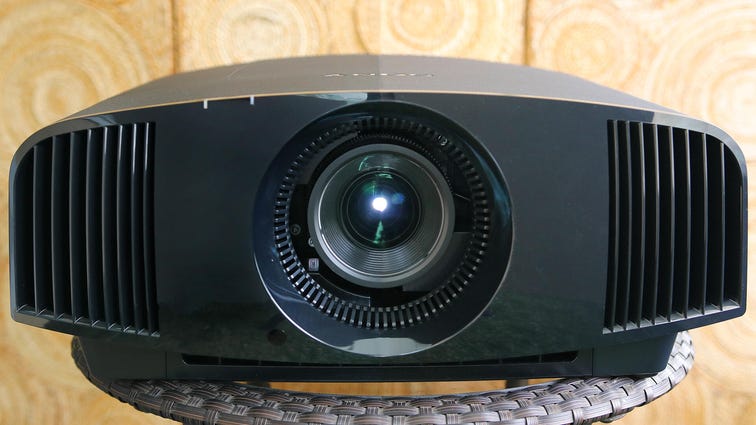

Geoffrey Morrison/CNET
The Sony VPL-VW325ES is a thoroughbred among ponies, a Porsche among Volkswagens, an absolute stunner with a price tag to match. The contrast ratio, easily the most important aspect of overall picture quality, is better than the Epson 5050 and significantly better than any projector that doesn’t cost significantly more. And that’s saying something, since the Sony itself costs significantly more than any other projector on this list. If price is no object, the 4K resolution picture quality is incredible.

 \n ","topic":"Projectors","ttag":"cxity","variant":"","viewguid":"","event":"listicle|image|4","correlationId":"","assettitle":"","campaign":"cxity","cval":48,"leadCpc":0.48,"leadProdPrice":2799.99,"manufacturer":"Optoma","productName":"Optoma UHZ50 Smart 4K UHD Laser Projector","seriesGuid":"649e84cd-4e17-4cad-8d28-d4973a040f83","sku":"UHZ50","reviewId":"","formatType":"IMAGE","location":"LIST","position":4,"dwLinkTag":"article-body|listicle|image","selector":"#article-body #listicle-92bec22b-7384-42aa-917d-af620e6487ee .itemImage"}}” rel=”noopener nofollow” target=”_blank”>
\n ","topic":"Projectors","ttag":"cxity","variant":"","viewguid":"","event":"listicle|image|4","correlationId":"","assettitle":"","campaign":"cxity","cval":48,"leadCpc":0.48,"leadProdPrice":2799.99,"manufacturer":"Optoma","productName":"Optoma UHZ50 Smart 4K UHD Laser Projector","seriesGuid":"649e84cd-4e17-4cad-8d28-d4973a040f83","sku":"UHZ50","reviewId":"","formatType":"IMAGE","location":"LIST","position":4,"dwLinkTag":"article-body|listicle|image","selector":"#article-body #listicle-92bec22b-7384-42aa-917d-af620e6487ee .itemImage"}}” rel=”noopener nofollow” target=”_blank”>
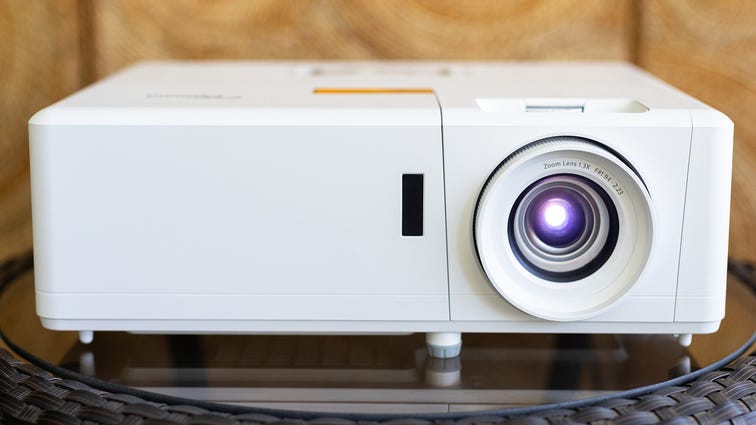

Geoff Morrison/CNET
The Optoma UHZ50, like the Epson LS11000, uses a laser to create light. The UHZ50’s blue laser is paired with a yellow phosphor, and the result is a bright, vibrant image. Detail is fantastic, and it turns on and off quickly, making it easy to live with. It’s also relatively quiet. The contrast ratio is very good for a DLP projector, but not as good as the LCD and LCOS projectors on this list. The small, inexpensive-looking case also has minimal zoom and lens shift, making it harder to fit in some rooms than the Sony and Epson options in this roundup. Overall, though, a great projector.

 \n ","topic":"Computer Accessories","ttag":"amazon","variant":"","viewguid":"","event":"listicle|image|5","correlationId":"","assettitle":"","campaign":"amazon","cval":36,"leadCpc":0.36,"leadProdPrice":1299,"manufacturer":"Optoma","productName":"Optoma UHD35","seriesGuid":"fd2e3739-92e3-463f-8e53-01488a027b2a","sku":"UHD35","reviewId":"04b2556f-6602-4c64-b7ea-1f54975de8b5","formatType":"IMAGE","location":"LIST","position":5,"dwLinkTag":"article-body|listicle|image","selector":"#article-body #listicle-3a79072f-037a-4a18-a0c8-07a306f9d994 .itemImage"}}” rel=”noopener nofollow” target=”_blank”>
\n ","topic":"Computer Accessories","ttag":"amazon","variant":"","viewguid":"","event":"listicle|image|5","correlationId":"","assettitle":"","campaign":"amazon","cval":36,"leadCpc":0.36,"leadProdPrice":1299,"manufacturer":"Optoma","productName":"Optoma UHD35","seriesGuid":"fd2e3739-92e3-463f-8e53-01488a027b2a","sku":"UHD35","reviewId":"04b2556f-6602-4c64-b7ea-1f54975de8b5","formatType":"IMAGE","location":"LIST","position":5,"dwLinkTag":"article-body|listicle|image","selector":"#article-body #listicle-3a79072f-037a-4a18-a0c8-07a306f9d994 .itemImage"}}” rel=”noopener nofollow” target=”_blank”>
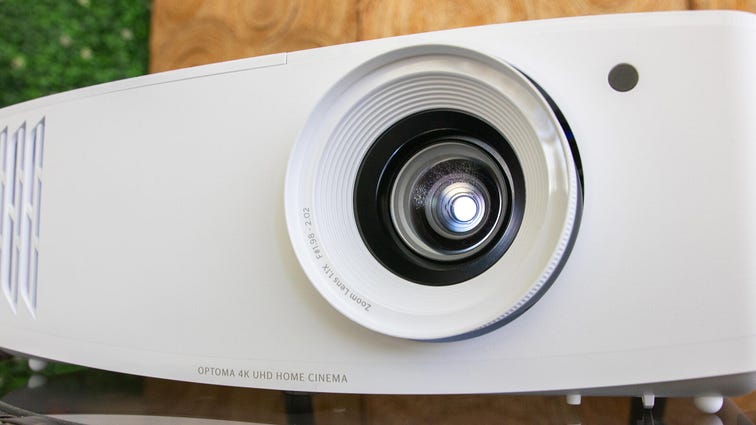

Geoffrey Morrison/CNET
The UHD35 packs a lot into its tiny case and low price. It can throw a ton of light, produces accurate colors and has great detail. The contrast ratio isn’t great, but is pretty average among 4K projectors in this price range. And that price really is the UHD35’s biggest selling point. It offers great picture quality for only a few hundred dollars over the best 1080p projectors. It doesn’t offer lens shift or much in the way of a zoom, but if it fits in your room it’s a great way to get 4K on a budget.

 \n ","topic":"Computer Accessories","ttag":"amazon","variant":"","viewguid":"","event":"listicle|image|6","correlationId":"","assettitle":"","campaign":"amazon","cval":36,"leadCpc":0.36,"leadProdPrice":1549.99,"manufacturer":"BenQ America Corp.","productName":"BenQ HT3550i","seriesGuid":"ef047167-b340-40a5-a604-53bd0e0b3146","sku":"HT3550I","reviewId":"c9e469da-01e3-4949-85b3-8fa7cdd21156","formatType":"IMAGE","location":"LIST","position":6,"dwLinkTag":"article-body|listicle|image","selector":"#article-body #listicle-76c05eaa-7abd-43f2-9a33-aebd5af47d9d .itemImage"}}” rel=”noopener nofollow” target=”_blank”>
\n ","topic":"Computer Accessories","ttag":"amazon","variant":"","viewguid":"","event":"listicle|image|6","correlationId":"","assettitle":"","campaign":"amazon","cval":36,"leadCpc":0.36,"leadProdPrice":1549.99,"manufacturer":"BenQ America Corp.","productName":"BenQ HT3550i","seriesGuid":"ef047167-b340-40a5-a604-53bd0e0b3146","sku":"HT3550I","reviewId":"c9e469da-01e3-4949-85b3-8fa7cdd21156","formatType":"IMAGE","location":"LIST","position":6,"dwLinkTag":"article-body|listicle|image","selector":"#article-body #listicle-76c05eaa-7abd-43f2-9a33-aebd5af47d9d .itemImage"}}” rel=”noopener nofollow” target=”_blank”>


Geoffrey Morrison/CNET
The BenQ HT3550i trades light output for deep colors. They’re not quite as deep as those found on the LG UH810PW, but they’re richer and more compelling than most projectors produce and the 3550i only costs roughly half of what the LG does. However, its contrast ratio is only average for a 4K projector, and the light output is far lower than average, meaning its image doesn’t pop the way images from other projectors on this list do.
Other products we’ve tested
LG HU810PW: The HU810PW costs about the same as the Optoma UHZ50, and is also a laser-powered DLP projector with 4K resolution. It has better lens shift, zoom, and is quieter in operation. However, the contrast ratio is quite poor, so it doesn’t look nearly as good overall as other 4K projectors we’ve tested. Read our LG HU810PW review.
Epson Home Cinema 2250: The HC 2250 is an excellent 1080p LCD projector. It won’t look nearly as detailed as any of the projectors in this list, but it’s bright and looks great otherwise. It’s also a lot cheaper. Read our Epson Home Cinema 2250 review.
BenQ HT2050A: The HT2050 has been one of our favorite home theater projectors for several years. Which is to say, it’s not new. So it’s not as bright as some other options, nor is it 4K. However, it looks fantastic and relatively inexpensive. Read our BenQ HT2050A review.
How we test 4K projectors
Every projector we review goes through elaborate objective and subjective testing. CNET editors pick the products and services we write about based on editorial merit. When you buy through our links, we may get a commission.
For more info, check out how CNET tests projectors.
4K Projector FAQs
Do I need a 4K projector?
All mid- and high-end projectors are either 1080p or 4K. On the huge screens typical of even a modest home theater, often 100 inches or more, the 4x difference between these resolutions is quite noticeable.
Resolution is only one aspect of picture quality, however. A great 1080p projector will always create a better image than a mediocre 4K projector. That said, the added resolution certainly doesn’t hurt, and adds a new layer of realism and fine detail to things like textures, hair, wrinkles, and more.
Should you break the bank to get a 4K projector? Absolutely not, but if you can easily afford it, a good 4K projector can look epic.
What kind of projector should you get?
LCD and Digital Light Processing projectors are the most common technologies. Higher-end projectors often use LCOS, or liquid crystal on silicon, designs. These are marketed as SXRD and DILA. LCOS is superior to LCD and DLP in almost every way, but is significantly more expensive.
LCD (used almost exclusively by Epson) and DLP both have their strengths and weaknesses. DLP is typically sharper, LCD often brighter. However, both technologies offer bright, sharp images. It’s more down to the specific model of projector than specific technologies.
Do you need a screen for a better projector experience?
It’s technically possible to use any flat surface to project your image. That is far from ideal, especially with 4K projectors. Any and all tiny bumps in a wall, for example, will be visible as extra “noise” in the image. This can be distracting and reduces the image quality of your expensive projector.
If you want the best image quality, even an inexpensive screen is a far better option. This is because projector screens tend to brighten the image noticeably and create a smooth surface that just shows your TV, movie or game.
